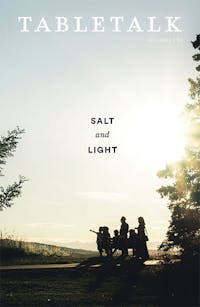
Request your free, three-month trial to Tabletalk magazine. You’ll receive the print issue monthly and gain immediate digital access to decades of archives. This trial is risk-free. No credit card required.
Try Tabletalk NowAlready receive Tabletalk magazine every month?
Verify your email address to gain unlimited access.
One of the universal traits among sinful humans is the urge to retaliate—an urge that Martyn Lloyd-Jones referred to as “one of the most hideous and ugly results of the fall of man.” In Matthew 5:38–42, Jesus issues a radical call to believers to be salt and light by resisting this tendency.
In the Sermon on the Mount, Jesus shares six “you have heard that it was said . . . but I tell you” sayings in which He corrects not the Old Testament law itself but certain misunderstandings and abuses of it. The Old Testament phrases “an eye for an eye, a tooth for a tooth” (Ex. 21:24; Lev. 24:20; Deut. 19:21) are just as misunderstood in our broader culture today as they were in Jesus’ day, frequently used as a reference to—or even justification for—revenge. At least three movies about revenge carry the title Eye for an Eye.
To understand Jesus’ radical call in this passage, we need to understand how “an eye for an eye” functioned in its old covenant context. First, along with ensuring that justice was done in response to harmful evil, the principle of “an eye for an eye” actually served to ensure that consequences were proportional to the crime and that punishment was appropriately limited. An eye for a tooth, or a life sentence for petty theft, would not be justice. Second, the principle of “an eye for an eye” was intended for public and legal justice carried out only by legitimate authorities and did not authorize retaliation by individuals (see Deut. 19:18–21).
non-retaliation as salt
Thus, Jesus’ instructions in Matthew 5:39–42 to not resist, to turn the other cheek, etc., do not negate these principles of public justice but rather speak to the way that this language was misapplied to justify personal retaliation. The Bible is consistent in its prohibition of revenge and retaliation in any circumstance (Lev. 19:18; Prov. 24:29; Rom. 12:19). Jesus has freed His people from bitterness toward others and from the impulse to retaliate, and He therefore calls disciples to a preservative, “salty” influence in society, promoting peace and breaking cycles of violence. As those who have the riches of God’s grace, who know the perfect (if not yet finalized) justice of God, and who live for the glory of God, Christians are free to respond to road rage, insults, and petty fraud with peace (Matt. 5:39), a willingness to lose (Matt. 5:40), and generosity (Matt. 5:41–42). Jesus Himself is our example in that “when he was reviled, he did not revile in return . . . but continued entrusting himself to him who judges justly” (1 Peter 2:23).
non-retaliation as light
But what of self-defense and justice? Do Jesus’ words in Matthew 5 prohibit Christians from opposing evil or pursuing enforcement of the law, as some have taught? The example of Jesus Himself and other teachings of Scripture lead away from this interpretation. Jesus verbally and physically opposed those defiling the temple (Matt. 21:12–17) and protested an unjust slap (John 18:19–24). Paul repeatedly defended himself against unjust treatment, and he teaches in Romans 13:1–7 that civil government is appointed as an avenger of God’s wrath on the wrongdoer. Jesus, in the Sermon on the Mount, is not addressing public justice or laying down a new law that is to be rigidly applied in every circumstance but is addressing the heart attitude of His people. In this sermon, He addresses those who are poor in spirit, meek, merciful, and peacemakers (Matt. 5:2–12), calling them to be prepared always to suffer, to give a cloak, or to go a second mile. His people are those who do not insist on their own rights for their own sake, who are free to overlook an offense, who think more of how they are free to bless others than what they have the right to claim or protect. This does not (and often should not) preclude efforts to defend oneself or others or to pursue legal justice. One can pursue justice without an attitude of bitterness or revenge.
Jesus’ words are a call to believers to radical discipleship, to be a light to a world shaped by the darkness of retaliation. In how they respond to personal offense, Christians shine a light on the power of Christ to free people from slavery to angry, vengeful impulses and to help others find contentment in the knowledge of Christ as perfect and final Judge. Christians as light point to the Savior who did not insist on His rights but made Himself nothing and became obedient even to death (Phil. 2:5–8) and who continues in long-suffering faithfulness to those who trust in Him (2 Peter 3:9).
